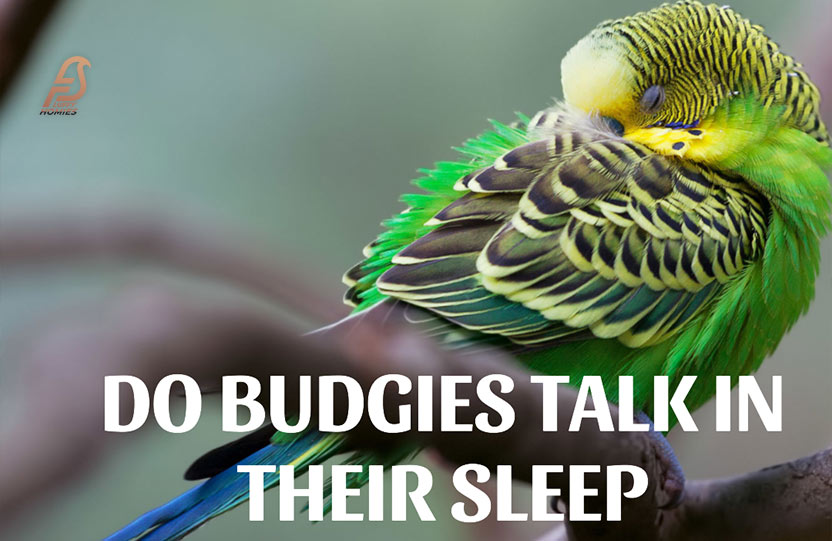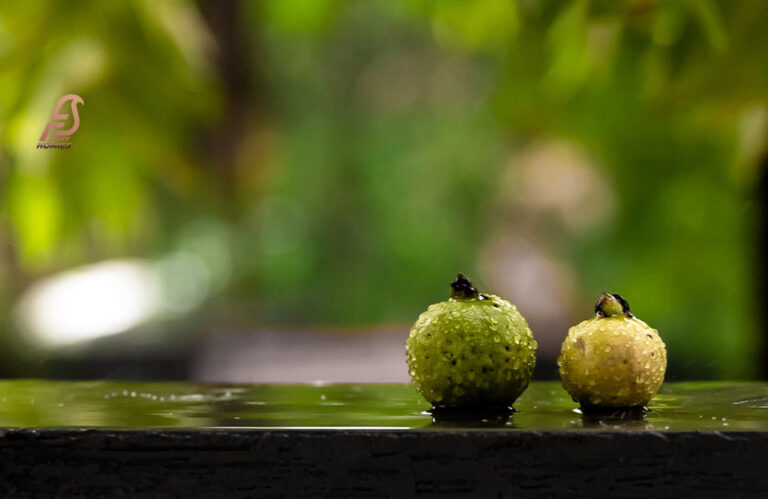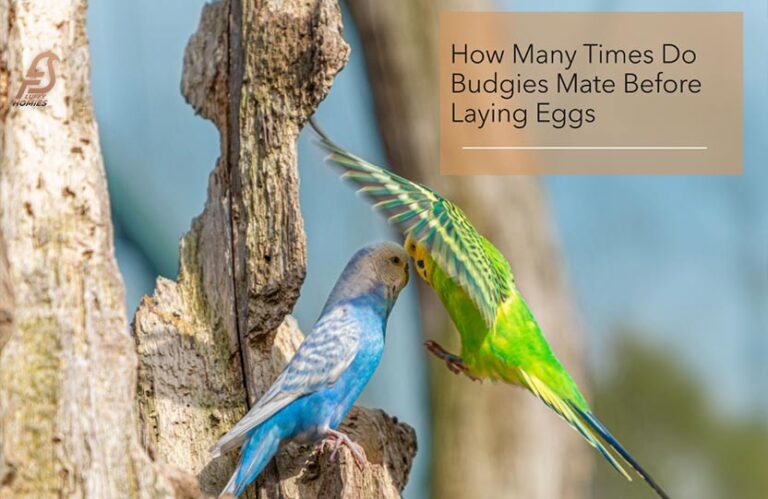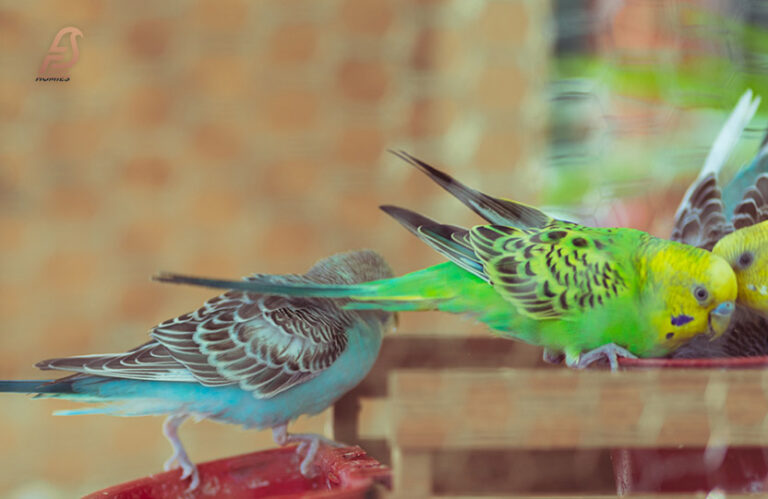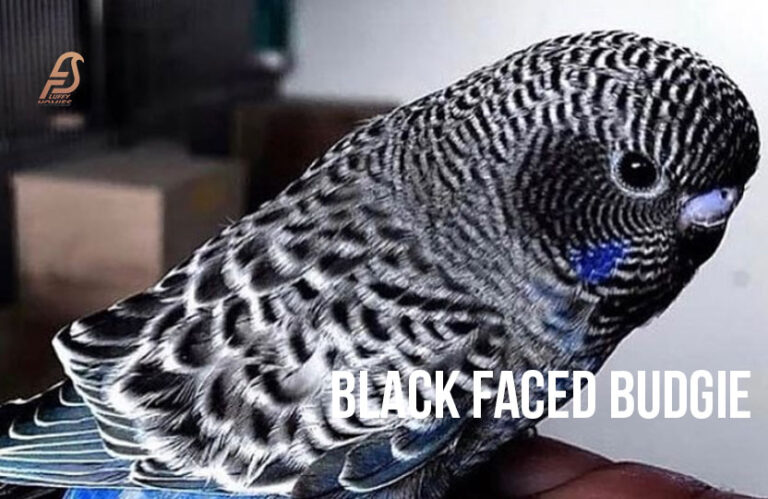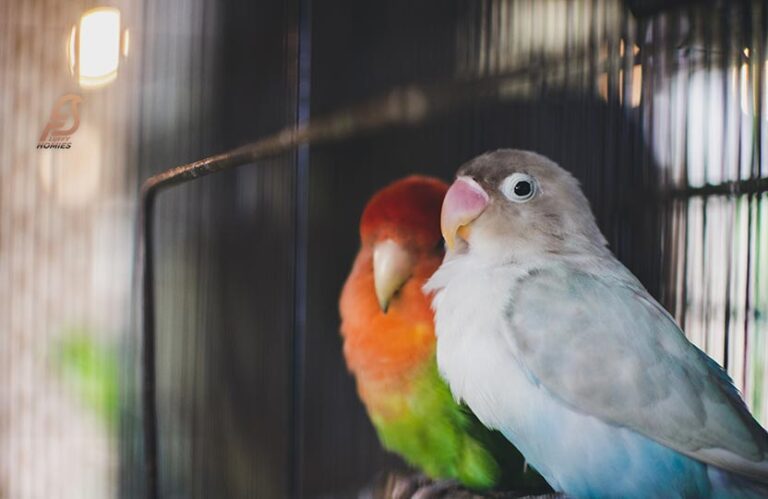Nightly Whispers: Why Do Budgies Talk in Their Sleep? (2023)
Budgies are small, intelligent birds that are not only cherished companions but also a subject of curiosity when it comes to their sleep behaviors.
One intriguing question that often arises is whether budgies talk in their sleep with the basic one that will budgies starve themselves.
In this article, we will explore the fascinating world of budgie sleep and unravel the mysteries behind their vocalizations, dreams, and behaviors during rest.
Join us on this journey as we delve into the enchanting realm of budgie slumber and discover what happens when these feathered friends drift off to sleep.
Do Budgies Talk in Their Sleep?
Speaking while you’re asleep is a phenomenon that is mostly seen in people. Humans may make sounds, words, or phrases during specific sleep stages without being aware of them.
However, there is little evidence or scientific evidence to support the idea that budgies can talk while they are asleep.
Budgies do vocalize throughout the day, imitating a variety of sounds, including human speech, that they hear around them. Budgies also like to climb for keeping them busy.
However, budgies typically fall into a state of rest during sleep, which causes their bodies to slow down and become relatively quiet. They typically close their eyes, tuck one leg up, and rest their head beneath a wing.
Budgies can occasionally make murmurs or soft chirping noises while they are asleep, though they may not talk actively.
However, rather than during the deeper stages of sleep, these sounds are more likely to happen during brief awakenings or transitions between sleep stages.
Why Do Budgies Talk in Their Sleep?
Budgies are known for their remarkable ability to mimic sounds and words, including human speech. This raises the question: Why do budgies talk in their sleep?
While the exact reasons are not fully understood, there are a few possible explanations for this behavior.
Natural Behavior
Budgies are social birds that communicate with each other through various vocalizations.
Mimicking sounds and words is a natural behavior for budgies, and it serves multiple purposes such as establishing social bonds, expressing emotions, and even seeking attention.
When budgies talk in their sleep, it may simply be a continuation of this natural behavior. Even during their slumber, their vocal cords may produce soft sounds or murmurs reminiscent of their waking conversations.
People also wonder that budgies eating their poop is their natural behavior or not and do budgies like to be touched.
Subconscious Imitation
Budgies have an impressive ability to imitate sounds they hear in their environment, including the human voice. They often learn new words and phrases through repetition and reinforcement.
When budgies sleep, their brain continues to process the information they have encountered throughout the day.
It’s possible that during this processing, their subconscious mind triggers the imitation of familiar sounds, including the words or phrases they have learned. As a result, budgies may occasionally produce speech-like sounds even when asleep.
Also Read: Why Budgies Adjust Their Crops?
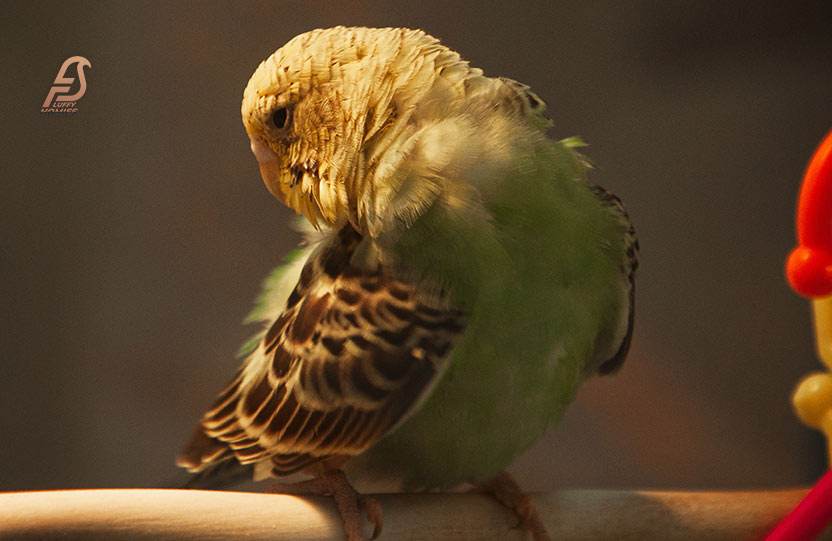
Comfort and Security
Similar to how some humans talk or make sounds during sleep as a means of self-soothing or expressing contentment, budgies may vocalize during sleep for similar reasons.
Sleeping is a vulnerable state for any living being, and vocalizing can provide budgies with a sense of comfort and security. The familiar sounds they produce may help them relax and feel protected during their slumber.
Environmental Factors
The environment in which budgies sleep can also influence their vocalizations. If there are external sounds or disturbances during their sleep, budgies may respond by vocalizing in their sleep.
For example, if they hear other birds or noise from the surroundings, it may trigger their instinctual response to vocalize, even if they are not fully awake.
Also Read: Why Does My Budgie Have Cold Feet?
Why Do Budgies Sing in Their Sleep?
Singing is a common behavior observed in budgies, and it often brings joy to both bird owners and enthusiasts. But what about singing in their sleep?
Why do budgies sing while they’re asleep? Let’s explore some possible explanations:
Territorial Behavior
In the wild, budgies establish territories and use vocalizations, including singing, to communicate and defend their space.
While sleeping, budgies may continue to display territorial behavior by singing softly. This behavior could be an instinctual response to signal their presence and maintain their perceived territory, even during sleep.
Contentment and Relaxation
Budgies are known to sing when they’re content and happy. Singing serves as a means of self-expression and can indicate that a budgie is feeling secure and at ease.
When budgies sing in their sleep, it may suggest that they are experiencing a state of relaxation and contentment during their slumber.
Dream Expression
For many animals, including birds, dreams are a necessary component of sleep. It is thought that birds, including budgies, may experience vivid dream-like states, though the precise nature of avian dreams is still unknown.
Budgies may sing as a form of expression during these dreams, mimicking their vocal patterns during the day.
It’s significant to note that budgies typically sing more subduedly and softer during sleep than they do during their vivacious daytime performances.
The reason for this behavior might not be the same as why they sing during the day, and it might be influenced by things like how they are sleeping and what they dream about.
Also Read: How Often Do Budgies Molt?
Do Budgies Dream While Sleeping?
Dreaming is a fascinating aspect of sleep that has intrigued scientists and humans alike. But what about budgies? Do they experience dreams? Let’s delve into this intriguing question:
Evidence of Avian Dreaming
While it’s challenging to study and understand the dreams of birds, there is evidence to suggest that avian species, including budgies, do experience some form of dreaming.
Studies have shown that birds exhibit similar brain wave patterns during sleep that are associated with dreaming in mammals. These patterns, known as rapid eye movement (REM) sleep, indicate the presence of dream-like activity.
Dream-Like Behaviors
During REM sleep, birds may exhibit behaviors that resemble dreaming in mammals. They may engage in movements such as twitching their wings, moving their legs, or making soft vocalizations.
These behaviors suggest that they may be experiencing dream-like states or engaging in dream-related neural activity.
Interpretation and Purpose
Interpreting the content and purpose of budgie dreams is a challenge, as we cannot directly ask them about their dream experiences.
However, it’s believed that birds, including budgies, may dream as a way of processing and consolidating information, practicing behaviors, or reliving experiences from their waking hours.
Dreams could also serve a cognitive and emotional function, similar to what is observed in mammals.
Also Read: Do Budgies Cry?
Do Budgies Snore While Sleeping?
Snoring is a common phenomenon observed in humans during sleep, but what about budgies? Do they snore? Let’s explore this aspect of budgie sleep:
Lack of Scientific Evidence
Unlike humans and some other animals, there is limited scientific research or evidence regarding whether budgies snore during sleep.
Snoring occurs when there is an obstruction or narrowing of the airway, leading to vibrations and the characteristic sound.
Since budgies have a different anatomy and respiratory system compared to mammals, it is unclear if they snore similarly.
Sleep Breathing
Budgies have a unique respiratory system that allows them to extract oxygen efficiently.
They possess air sacs and a system of one-way airflow, which enables them to breathe effectively during both wakefulness and sleep.
This efficient respiratory mechanism may contribute to a reduced likelihood of snoring in budgies.
Individual Variations
It’s important to recognize that budgies, like any living beings, can have individual variations in their sleep patterns and behaviors.
While snoring may not be commonly reported in budgies, some individuals may exhibit occasional snoring-like sounds or breathing patterns during sleep.
However, it’s important to consult an avian veterinarian if you have concerns about your budgie’s breathing or if you notice any unusual respiratory sounds.
Also Read: Why Do Budgies Die Suddenly?
How Do I Know If My Budgie Is Sleeping?
Determining whether your budgie is sleeping can sometimes be a challenge, as they can exhibit different behaviors during their rest.
However, there are certain signs and cues you can look for to identify if your budgie is sleeping:
Relaxed Posture
When budgies are asleep, they often assume a relaxed and comfortable posture. Their body may be perched on one leg, with feathers fluffed up to provide insulation and warmth. This relaxed stance indicates that your budgie is in a state of rest.
Closed Eyes
Similar to humans, budgies usually close their eyes when they’re asleep. If you notice your budgie with closed eyes while perched or resting, it’s a good indication that they are in a sleep state.
Quietness
Budgies tend to be quieter during sleep compared to their active and vocal daytime behavior.
If your budgie is not engaging in chirping, singing, or other vocalizations and is generally calm and quiet, it suggests they are likely asleep.
Reduced Movement
During sleep, budgies generally exhibit minimal movement. They may remain in one place for extended periods without actively hopping or flying around. This reduced activity level indicates that your budgie is in a state of rest.
Diminished Responsiveness
When budgies are deeply asleep, they may be less responsive to external stimuli. You may notice a slower response or no response to sounds or movements in their environment.
However, it’s important to approach this observation with caution, as budgies can also enter a light sleep phase where they remain more alert to their surroundings.
It’s essential to respect your budgie’s sleep and provide them with a calm and undisturbed sleeping environment.
Avoid sudden loud noises or disruptions that could startle them out of their sleep or disrupt their sleep patterns.
How Can I Promote Healthy Sleep for Budgies?
Just like humans, budgies require adequate and quality sleep to maintain their overall health and well-being. As a budgie owner, you can take several steps to promote healthy sleep for your feathered companion:
Establish a Consistent Sleep Schedule
Budgies thrive on routine, so it’s important to establish a consistent sleep schedule. Ensure they have a designated sleep area or cage where they can retreat for restful sleep.
Aim for approximately 10-12 hours of sleep per night, providing them with a quiet and dark environment during their designated sleep hours.
Create a Calm Sleep Environment
Budgies are sensitive to their surroundings, so it’s crucial to create a calm and peaceful sleep environment for them.
Place their sleep area away from noisy areas, such as televisions or high-traffic zones, to minimize disruptions. Use curtains or covers to create a dark and cozy space that simulates natural nighttime conditions.
Provide a Comfortable Sleep Setup
Offer your budgie a comfortable and secure sleeping space. Ensure they have a cozy and appropriately sized perch or sleeping area where they can rest comfortably.
Providing a variety of perches of different diameters can help promote foot health and prevent discomfort during sleep.
Minimize Disturbances
Budgies can be easily disturbed by sudden loud noises or movements. To promote uninterrupted sleep, minimize disturbances during their designated sleep hours.
Keep other pets or loud activities away from their sleeping area, and avoid using bright lights or exposing them to excessive noise that can startle or disrupt their sleep.
Monitor Temperature and Humidity
Maintain an appropriate temperature and humidity level in the room where your budgie sleeps. Extreme temperatures or high humidity can negatively affect their sleep quality and overall health.
Ensure the sleeping area is within a comfortable temperature range, typically between 65-80°F (18-27°C), and maintain suitable humidity levels between 40-60%.
Regular Exercise and Mental Stimulation
Engage your budgie in regular exercise and mental stimulation during their waking hours.
Providing opportunities for play, social interaction, and exploration can help promote healthy fatigue and more restful sleep. A tired budgie is more likely to sleep soundly during their designated sleep time.
Conclusion — Do Budgies Talk in Their Sleep?
While the question of whether budgies talk in their sleep remains unanswered, the sleep behavior of these fascinating birds deserves attention.
Understanding their sleep patterns, providing a comfortable sleep environment, and recognizing natural budgie sleep behaviors are key steps for budgie owners to ensure their pets’ well-being.
By observing and catering to their sleep needs, you can contribute to the overall health and happiness of your beloved budgie companion.
FAQs — Do Budgies Talk in Their Sleep?
Can budgies have nightmares?
While it’s difficult to determine if budgies experience nightmares, they may display signs of fear or stress during sleep, such as rapid breathing or fluffing up their feathers. Providing a calm sleeping environment can help ensure their restful slumber.
How long do budgies sleep?
Budgies typically require 10 to 12 hours of sleep per day. It’s essential to provide a quiet and dimly lit space for them to rest, away from disturbances and bright lights.
Do budgies make noise at night?
Yes, budgies can make noise at night, although they are generally quieter during their resting hours compared to their daytime activity.
Why does my bird make weird noises while sleeping?
Birds may make weird noises while sleeping due to dreaming, involuntary muscle twitches, or respiratory or digestive issues. It’s best to consult a veterinarian if concerned about your bird’s sleep behavior.
